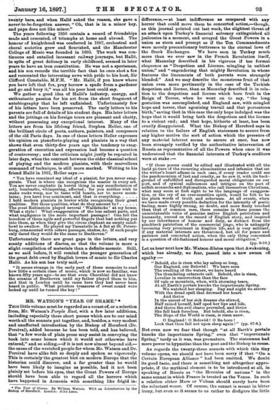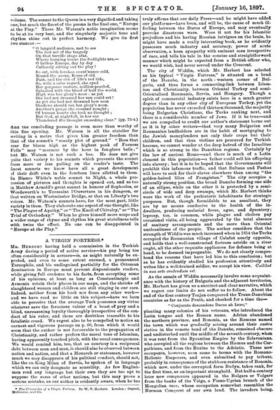MR. WATSON'S "YEAR OF SHAME." *
Tars little volume must be regarded as a recast of, or a selection from, Mr. Watson's Purple East, with a few later additions, including especially three short poems which are to our mind worth all the sonnets put together, and, besides, a very modest and unaffected introduction by the Bishop of Hereford (Dr. Percival), added because he has been told, and has believed, that "a few words of plain prose may assist in conveying the book into some homes which it would not otherwise have entered," and so aiding,—if it is not now almost beyond aid,— the cause of the wretched people for whom Mr. Watson and Dr. Percival have alike felt so deeply and spoken so vigorously. This is certainly the greatest blot on modern Europe that the historian could discover, and a far greater than be would have been likely to imagine as possible, had it not been plainly set before his eyes, that the Great Powers of Europe should have been able to regard all the horrors which have happened in Armenia with something like frigid in- * The Year of Shame. By Wiliam Watson. With an Introduction by the Bishop of Hereford. London Jchn Lane. difference,— at least indifference as compared with any horror that could move them to concerted action,—though,
as this journal pointed out last week, the slightest threat of an attack upon Turkey's financial solvency extinguished all jealousies in a moment, and arrayed the Great Powers in a. union as stern and prompt as if the Ten Commandments were merely precautionary buttresses to the eternal laws of the Stock Exchanges. We have seen in Turkey much more than we ever saw in the French Revolution itself,. what Macaulay described in his vigorous if too formal eloquence as "Despotism and License, mingling in unblest union," and "engendering that mighty Revolution in whose features the lineaments of both parents were strangely blended." And we may describe the monstrous fruit of that union even more pertinently in the case of the Turkish despotism and license, than as Macaulay described it in rela- tion to the despotism and license which bore fruit in the Reign of Terror, when he went on to say, "the long gestation was accomplished, and England saw, with mingled hope and terror, that agonising travail and that portentous birth," saving that in this case the only hope indulged was the hope that it would bring both the despotism and the license to a violent end ; and that hope, hitherto at least, has been cruelly disappointed. What the Bishop of Hereford says .in relation to the failure of English statesmen to secure from any higher motive the sort of action which the pressure of any material interest seems to secure at once, has now been strangely verified by the authoritative intervention of Russia as representative of all the Powers when once it was understood that the financial interests of Turkey's creditors were at stake :—
.If these poems could be edited and illustrated with all the- lurid picture of the recurring abominations and infamies that set the writer's heart aflame in each case, if every reader could see the pandemonium of lust and cruelty, as he saw it, with its back- ground of unfulfilled and disregarded moral obligations on our pirt, and of cynical callousness and intrigue on the part of selfish monarchs and diplomatists, who call themselves Christians, what may seem at first sight to be the language of exaggera- tion, or the cry of an over-sensitive spirit, would be felt to be- the plain words of truth and soberness. At all events, when we have made every possible deduction for the intensity of poetic feeling, more highly strung, no doubt, and more finely touched than that of common men, there remains in these poems the unmistakeable voice of genuine native English patriotism and humanity, nursed on the record of English story, and inspired by our inheritance of honour and duty, as distinct from the pinchbeck patriotism of the commercial jingo, who is unhappily becoming very prominent in English life, and is very militant, if any material interests are threatened, but all for peace and patience and concerted action, when the only thing concerned, is a question of old-fashioned honour and moral obligation." (PP. 940-) Let us hear next how Mr. Watson dilates upon that Awakening,
which has already, we fear, passed into a new swoon on apathy :—
" Behold, she is risen who lay asleep so long,
Our England, our Beloved ! We have seen The swelling of the waters, we have heard The thundering cataracts call. Behold, she is risen, Lovelier in resurrection than the face Of vale or mountain, when, with storming tears, At all Earth's portals knocks the importunate Spring.
We watched her sleeping. Day and night we strove.
With the dread spell that drowsed her heart.
And thrice In the unrest of her sick dreams she stirred,
Half raised herself, half oped her lips and lids,
And thrice the evil charm prevailed, and thrice
She fell back forceless. But behold, she is risen,, The Hope of the World is risen, is risen anew.
0 England! 0 Beloved ! 0 Re-born ! Look that thou fall not upon sleep again!" (pp. 67-8.).
But even now we fear that though "at all Earth's portals knocks the importunate Spring," even that "importunate Spring," tardy as it was, was premature. The statesman had more power to hypnotise than the poet and the Bishop to rouse.
As regards the twenty-three sonnets with which this tiny volume opens, we should not have been sorry if that "On a Certain European Alliance" had been omitted. We doubt its good taste, and there is something not altogether appro- priate, if the mythical element is to be introduced at all, in speaking of Russia as "the Hercules of nations" in the same sonnet in which France is treated as the Venus. In such a relation either Mars or Vulcan should surely have been the reluctant wooer. Of course, the sonnet is meant in bitter irony, but even so it seems to us rather to disfigure the little volume. The sonnet to the Queen is a. very dignified and taking one, but much the finest of the poems is the final one, "Europe at the Play." There Mr. Watson's noble imagination seems to be at its very best, and the singularly majestic tone and rhythm shine out in perfect harmony. We give its first two stanzas :—
" 0 languid audience, met to see
The last act of the tragedy On that terrific stage afar, Where burning towns the footlights are,—
o listless Europe, day by day
Callously sitting out the play !
So sat, with loveless count'nance cold, Round the arena, Rome of old.
Pain, and the ebb of life's red tide, So, with a calm regard, she eyed Her gorgeous vesture, million-pearled, Splashed with the blood of half the world.
High was her glory's noon : as yet She had not dreamed her sun could set !
As yet she had not dreamed how soon Shadows should vex her glory's noon.
Another's pangs she counted nought ; Of human hearts she took no thought ; But God, at nightfall, in her ear
Thundered His thought exceeding clear." (pp. 73-4.)
Ana the concluding passage is even more than worthy of this fine opening. Mr. Watson is all the statelier for writing in a metre that gives him greater freedom than that of the sonnet's "scanty plot of ground." "Bees that soar for bloom high as the highest peak of Furness Fells" may "murmur by the hour in fox-glove bells ; " bat Mr. Watson is not such a bee. He does not give mite that variety to his sonnets which prevents the sonnet from more or less palling on the reader's taste. The finest sonnets we know have all a great development 3f their drift even in the fourteen lines allotted to them.
En Blanco White's noble sonnet to Night, a whole pro- zession of pictures and thoughts is opened out, and so too in Matthew Arnold's great sonnet in honour of Sophocles, or Wordsworth's to Toussaint l'Onverture in his dungeon, or that written on Westminster Bridge, or that on Liberty's two voices. Mr. Watson's sonnets have, for the most part, little variety in them. They elaborate one aspect of one thought, like "The Plague of Apathy," or "The Knell of Chivalry," or "The Trial of Orthodoxy." When he gives himself more scope and a wider range of rhyme and rhythm his great stateliness tells with twice the effect. No one can be disappointed in "Europe at the Play."







































 Previous page
Previous page